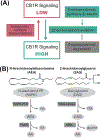Meet Your Stress Management Professionals: The Endocannabinoids
- PMID: 32868170
- PMCID: PMC7530069
- DOI: 10.1016/j.molmed.2020.07.002
Meet Your Stress Management Professionals: The Endocannabinoids
Abstract
The endocannabinoid signaling system (ECSS) is altered by exposure to stress and mediates and modulates the effects of stress on the brain. Considerable preclinical data support critical roles for the endocannabinoids and their target, the CB1 cannabinoid receptor, in the adaptation of the brain to repeated stress exposure. Chronic stress exposure increases vulnerability to mental illness, so the ECSS has attracted attention as a potential therapeutic target for the prevention and treatment of stress-related psychopathology. We discuss human genetic studies indicating that the ECSS contributes to risk for mental illness in those exposed to severe stress and trauma early in life, and we explore the potential difficulties in pharmacological manipulation of the ECSS.
Keywords: 2-arachidonoylglycerol; N-arachidonoylethanolamine; cannabinoid receptor; fatty acid amide hydrolase; monoacylglycerol lipase.
Copyright © 2020 Elsevier Ltd. All rights reserved.
Conflict of interest statement
Conflict of Interest:
Cecilia Hillard is a member of the board of scientific directors for Phytecs, Inc and Beryl Therapeutics.
Figures



References
-
- Romero LM et al. (2009) The Reactive Scope Model - a new model integrating homeostasis, allostasis, and stress. Horm Behav 55 (3), 375–89. - PubMed
-
- Ritchie H and Roser M (2018) Mental Health. (accessed June 21 2020).
Publication types
MeSH terms
Substances
Grants and funding
LinkOut - more resources
Full Text Sources
Medical

